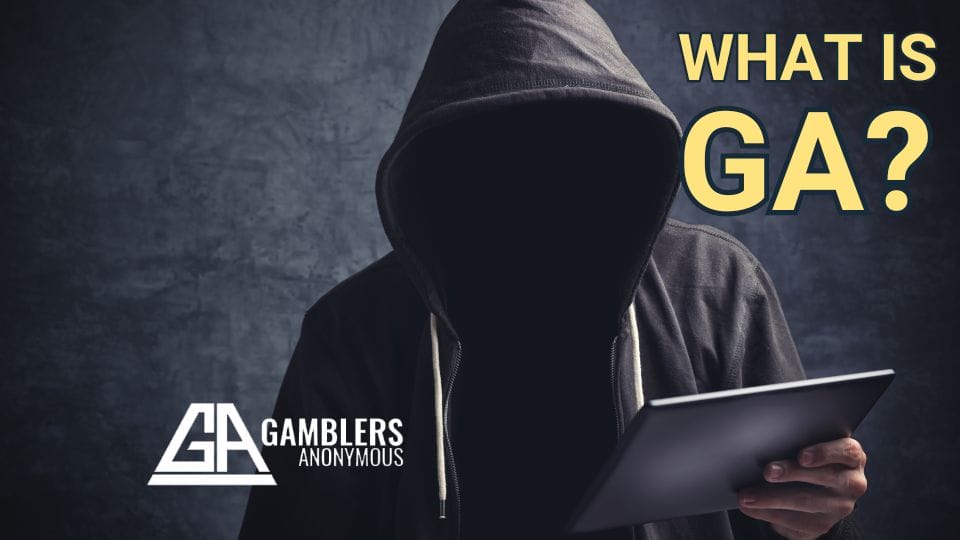GA has become the go-to organization for many struggling with their relationship with gambling since its conception in 1957. In this article, we will explore the history of Gamblers Anonymous and how it has evolved to understand its impact on society better today.
Gamblers Anonymous can be an excellent resource for those struggling with gambling addiction. However, we understand that it may not work for everyone. If you’re looking for an alternative, QuitGamble.com offers a supportive community and a variety of resources to help you on your journey to recovery. We encourage you to explore our website and see if it fits you. We can highly recommend our How to stop gambling guide, and you’re most welcome to join our community.
The origins of GA can be traced back to California in 1957 when two recovering gamblers decided they needed more than support from friends and family to overcome their addiction. They wanted a forum where people could share stories, offer guidance and discuss strategies for staying away from gambling altogether. The success of these meetings soon spread throughout the US, then across the globe, giving birth to what is now known as Gamblers Anonymous – an international fellowship dedicated to helping compulsive gamblers find recovery.
Today, thousands of active members attend weekly meetings at various locations worldwide, each offering mutual understanding, strength, and hope through inspiring testimonies and shared experiences.
An Overview of Gamblers Anonymous
Gambling Anonymous (GA) is a 12-step program for compulsive gamblers. It was inspired by Alcoholics Anonymous and used spiritual principles to help individuals overcome their gambling addiction. GA’s first group meeting occurred in Los Angeles, California, on September 13th, 1957. Since then, the organization has provided support to pathological gamblers around the world who are seeking treatment for problem gambling.
The primary purpose of Gamblers Anonymous is to stop compulsive gambling and help members live everyday lives free from the effects of gambling disorder. To do so, GA offers meetings where participants can share stories and learn coping skills that will aid them in recovery. Additionally, GA provides educational materials about responsible gaming habits and referrals to counseling services if needed.
Some studies show that participating in Gamblers Anonymous programs reduces gambling addiction symptoms and increases abstinence rates among members over time. To maximize its effectiveness, it is important for those suffering from pathological gambling to attend regular meetings and stay committed to following through with all steps outlined during these sessions.
Structure Of The Organisation
Little did the compulsive gambler Bill W. know when he attended his first Gamblers Anonymous (GA) meeting in 1957 that it would be the start of a movement to help those suffering from compulsive addictions lead everyday and happy lives. Today, GA has become an international organization with thousands of members across the globe who attend meetings and gain support from fellow members battling similar issues.
The structure of Gamblers Anonymous is based on 12 steps, which are divided into three categories:
- Physical health
- Mental health
- Spiritual growth
These steps encourage its members to take responsibility for their actions, including group meetings, sponsorships, and favorable publicity regarding recovery efforts. The attendance of GA meetings by its members helps them stay connected with like-minded individuals while they all strive towards achieving sobriety.
GA offers many resources such as literature, pamphlets, and online forums where compulsive gamblers can talk about their struggles with other people who have gone through or are going through similar experiences. Gambling Anonymous provides a safe space for these individuals to discuss personal matters without fear of judgment or criticism. Moreover, attending regular weekly meetings held at local venues allows members to share their stories openly so that others may learn from one another’s experiences.
Thus, Ga has proven beneficial for compulsive gamblers and anyone affected by addiction in general. It provides guidance and support along the path to recovery – enabling them to lead meaningful lives free from compulsion or addiction.

Similarities And Differences To Anonymous Alcoholics
Gamblers Anonymous (GA) is a fellowship of men and women who have come together to share their experience, strength, and hope with each other to help them recover from gambling addiction. GA follows the same twelve-step program as Alcoholics Anonymous (AA). Still, it was founded independently of AA by two groups: one group of gamblers in Los Angeles, California, in 1957 and another in Phoenix, Arizona, in 1968. Thus, there are some similarities between GA and AA’s programs; however, several differences distinguish the two fellowships.
The table below outlines the key similarities and differences between AA and GA:
| Similarities | Differences |
| Follow 12-Step program | Fellowship Structure & Attendance Rules Differ |
| Word Spiritual Basis | Different Attitudes Toward Gambling & Religion |
| Meetings Led By Members | Gam-Anon Support Group For Family/Friends Of Addicts |
The most apparent similarity between GA and AA is their shared twelve-step program, which focuses on facing reality, admitting powerlessness over addiction, making amends for past wrongs while under the influence of drugs or alcohol, relying on a higher power for guidance through prayer or meditation, etc.
The spiritual basis is effective at helping people work towards recovery. However, although both organizations use this base structure when conducting meetings—such as having members speak about their experiences—there are still significant differences between how these meetings play out.
First off, the nature of attendance differs greatly since many more family members attend GA than they do AA due to its focus on handling financial matters associated with problem gambling rather than just individual issues related to drug or alcohol abuse.
Additionally, religion plays a larger role within AA compared to GA. In contrast, attendees may participate in religious rituals such as praying before meals during an AA meeting—something rarely seen at GA gatherings—many consider themselves not spiritual nor religious when participating in a discussion at a local GA group.
Furthermore, those affected by someone else’s gambling can find support via Gam Anon – an organization specifically designed for friends and families of addicts whose lives have been impacted by someone else’s gambling disorder. No such equivalent exists within alcoholism treatment affiliated with Alcoholics Anonymous.
While sharing certain core principles, the practices observed within Gamblers Anonymous (GA) and Alcoholics Anonymous (AA) differ somewhat due to varying attitudes toward gambling, religion, attendance rules, and additional services offered.
How Has Gamblers Anonymous Changed Over Time
The transformation that Gamblers Anonymous has gone through over the years is impressive, from a chance meeting between two degenerate gamblers to hundreds or thousands of members attending GA meetings worldwide today. It’s no wonder why people are so passionate about this organization and its ability to help real compulsive gamblers battle their addictions.
Not only does GA allow anonymous members to meet regularly and discuss their gambling behavior, but it can also refer to professional gambling treatment for those seeking more than just support from other recovering gamblers. It includes advice on managing finances more responsibly, coping with urges to gamble, talking openly and honestly about gambling outcomes, and even involving family members in recovery efforts.
GA has been instrumental in helping countless individuals stop gambling altogether and get back on track toward living healthier lives. These incredible volunteers’ impact on society cannot be understated. They offer hope beyond what many thought possible before coming into contact with them. With each new day comes another chance for success as long as we continue adhering to the principles of Gamblers Anonymous.
Gamblers Anonymous Online
With the advent of the internet and its ability to connect people worldwide, Gamblers Anonymous has had to evolve with it. As more individuals struggle with a gambling problem in recent years, the need for online support has increased. While some might view this as a relatively new development within Gamblers Anonymous, it has a long and baffling history.
Today, not only are these meetings still held across the United States, but they also exist online meetings in many forms. From forums to chat rooms and even video conferences, those suffering from compulsive addictions now have access to much-needed help from all over the globe. If you want to know more, you can check out the guide on what happens during GA online meeting.
Gamblers Anonymous encourages members to take responsibility for their abstinence by working hard to build up their highest and finest character qualities so they may never return to their old ways again.
Through this process, they attempt to develop better habits while striving towards self-improvement through other activities, such as reading spiritual literature or attending lectures about stopping gambling altogether. It’s fascinating how far technology has come since its inception nearly 70 years ago, allowing anyone who wishes to gain insight into their own lives or learn more about gambling studies an opportunity to do so without ever leaving home.
How Is Gamblers Anonymous Funded?
Up to 20 million Americans show signs of gambling problems. The harm caused by gambling issues has prompted the need for groups like Gamblers Anonymous (GA), funded mainly through donations and membership fees from its attendees. GA provides helpful gambling resources such as group meetings, treatment outcomes, anonymous literature, and even substance abuse counseling to those in need.
- Funding comes from within GA: members’ dues, contributions, and fundraising activities.
- Donations were given by individuals and organizations who support the cause of helping people with their gambling addiction and other related problems.
- Grants given by state or local governments recognize the importance of treating this disorder effectively.
These sources have enabled GA to continue supporting those suffering from compulsive gambling so that they can lead normal happy lives without being consumed by their addictions. Marie Curie once said, “You cannot hope to build a better world without improving the individual”. The statement reflects well on how GA works towards understanding the complexities of the human mind while promoting responsible behavior among gamblers to tackle any associated risks.
Frequently Asked Questions
Who can join Gamblers Anonymous?
The qualifications to become a member of Gamblers Anonymous are straightforward. To join, an individual must desire to stop gambling and be committed to staying away from it. It does not matter if the person has already stopped gambling or is still actively participating; anyone with this desire can join the group.
There are no restrictions on who may enter Gamblers Anonymous based on race, gender, age, religion, sexual orientation, economic condition or any other factor. The only requirement for entry is that they are willing to avoid all forms of gambling. It includes playing slot machines, betting on sports games, and visiting casinos.
Gamblers Anonymous provides support groups that meet regularly across countries around the world. They offer information about treatment options for those struggling with addiction and provide resources for family members trying to help someone recover from problem gambling behaviors. Members also benefit from sharing stories and experiences to understand how others cope with similar issues. By joining support networks like these, individuals can find understanding and hope when dealing with difficult situations related to their addictions.
Are There Any Religious Requirements For Gamblers Anonymous Membership?
Joining GA does not require any particular religion or spiritual practice. Members come from many different backgrounds and belief systems, with no one faith dominating the group. While some may draw on spirituality to recover from their addictions, religion isn’t mandatory for participation in GA meetings.
Membership does not involve making particular commitments or taking an oath of allegiance to the organization. It simply requires a shared commitment among participants to help each other stay sober and abstain from problem gambling behaviors. The shared goal is a sufficient unifying force regardless of individual religious beliefs or affiliations.
At its core, GA offers support through fellowship and encourages members to take responsibility for their recovery journey, which resonates across different faiths and cultures. Ultimately, it is up to them whether someone chooses to explore spirituality in their recovery process. At Gamblers Anonymous, everyone’s story matters equally regardless of what faith they may follow or if they choose none at all.
How Often Do GA Meetings Take Place?
Meetings of Gamblers Anonymous (GA) take place regularly. Each local chapter determines the frequency of the arrangements. Some chapters have weekly or bi-weekly meetings, and others have monthly sessions. GA also offers phone support services to those who cannot attend a physical meeting. It allows members to get the help they need regardless of location or mobility restrictions.
In addition to providing a safe space for individuals struggling with gambling addiction, these meetings allow people to connect and build relationships with one another.
Group discussions focus on recovery topics such as gambling relapse prevention strategies, lifestyle changes that can improve overall well-being, and tools to cope with stress and cravings. Through sharing stories and experiences in this supportive environment, members gain insight into how different coping mechanisms work for them.
These meetings offer a sense of community essential in any journey towards lasting sobriety from compulsive behaviors like gambling. It is important for anyone dealing with this issue to remember that there is no shame in seeking support from professionals or fellow addicts through programs like Gamblers Anonymous – only strength!
How Can I Find A Local Gamblers Anonymous Group?
Finding a local Gamblers Anonymous group can help tackle problem gambling. With meetings occurring worldwide, anyone can find help and support from fellow gamblers who have experienced similar difficulties. But how do you find out where your nearest Gamblers Anonymous meeting is?
There are several ways of locating a nearby GA meeting. The most straightforward method is to use online search engines such as Google or Bing and enter ‘Gamblers Anonymous’ plus the name of your city or town. It should bring up any relevant results that include contact details for local groups. Additionally, many countries have dedicated websites with listings of all GAs in that nation, making this process even easier.
Finally, contacting the national helpline could prove helpful if these methods don’t produce beneficial results. Most countries will provide confidential advice on addiction issues over the phone and may be able to tell you about any good resources in your area relating to gambling problems. No matter what route you choose, seeking help through a local Gamblers Anonymous group is often essential to managing addictive behavior patterns related to gambling.
Does Gamblers Anonymous cost anything?
Joining Gamblers Anonymous (GA) can be an important part of the recovery process for those struggling with gambling addiction. But many people wonder if there is a cost associated with joining this support group. Let’s look at this issue and what it means to become a member of GA.
- No sign-up fee or membership dues
- Free access to online resources
- Local meetings are free of charge
- Donations are voluntary
- Phone and text support services may have costs
The main thing to remember about becoming a Gamblers Anonymous member is that no membership fees are involved. You won’t need to pay to join, attend meetings, or access their online resources. Donations are accepted but never expected when attending local meetings. These donations help cover the costs of hosting these events, such as renting space and providing materials like pamphlets and booklets.
It’s also worth noting that some phone and text support services offered by Gambler Anonymous come at a cost— usually around $1 per minute for calls. Specific plans offer unlimited texting for an additional monthly fee. However, you should know that even if you cannot afford these services, plenty of free options are available through the organization, including anonymous helplines, email support groups, and more.
No matter your financial situation, there are ways to get help from Gamblers Anonymous without paying out-of-pocket expenses. With so much information and resources available through them, anyone looking to break free from the hold of problem gambling can find the guidance they need here on their journey towards sobriety.
Conclusion
We all know that gambling can be a dangerous habit. That’s why Gamblers Anonymous was created to help those struggling with addictions. The qualifications for membership are simple – have you ever felt the need to gamble compulsively? If so, then you qualify! There is no religious or spiritual requirement, and meetings usually occur once a week. All it takes is one step forward to find local support groups and begin your healing journey.
There’s no cost associated with joining Gamblers Anonymous – only potential freedom waiting on the other side of recovery. So if you’re looking for guidance and support during this challenging time, don’t hesitate to reach out today – you’ll be glad you did!
QuitGamble.com is an alternative to Gamblers Anonymous. If GA works for you, we are super happy. It means you’ve found something that helps you, which is all that matters. If you want to try something else, we recommend you check out the website and online community here on QuitGamble.com.

GA: Once an addict always an addict. . .
We refuse to accept that! Our Stop Gambling Masterclass is an modern alternative to GA!

 English
English Español
Español Français
Français Português
Português Svenska
Svenska